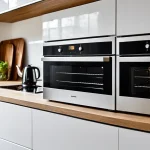UK Kitchens Leading the Shift to Renewable Energy
UK kitchens are increasingly becoming hubs for renewable energy adoption. Homeowners and designers alike prioritize integrating sustainable kitchen trends that reduce carbon footprints while enhancing efficiency. This shift is driven by a growing awareness of environmental impacts and the desire to lower energy bills.
Innovations in renewable energy for kitchens include solar-powered appliances and energy-efficient lighting tailored specifically for kitchen use. These renewable energy innovations enable kitchens to use less grid electricity, sometimes generating their own power through solar panels integrated into home energy systems. The demand for greener homes has accelerated the development of smart energy management systems which optimize usage in real time.
Also to see : Revolutionizing british kitchens: the impact of cutting-edge technologies
Sustainable kitchen trends also encompass using materials and technologies designed to minimize waste and promote longevity. As these trends gain popularity, the UK’s movement towards environmentally conscious kitchen design demonstrates that adopting renewable energy isn’t just practical—it’s becoming an expectation. The result is a cleaner, smarter, and more sustainable home environment reflecting a national commitment to reducing environmental impact while maintaining modern convenience.
Key Renewable Energy Technologies in Modern UK Kitchens
Small steps, big energy savings
Topic to read : Discovering modern innovations: how uk kitchens are evolving with current trends
Solar panels UK kitchens have become increasingly popular as a primary green technology choice. By harnessing sunlight, these panels provide clean, renewable electricity directly to kitchen appliances, reducing reliance on grid power and lowering household energy bills significantly. Their integration supports sustainable living while powering everyday kitchen activities.
Energy-efficient appliances are another cornerstone of modern sustainable kitchens. Devices such as refrigerators, dishwashers, and ovens designed with advanced technologies consume less electricity without sacrificing performance. Opting for these appliances not only contributes to environmental conservation but also cuts operating costs in daily kitchen use.
Heat pumps kitchens incorporate offer a smart solution for heating and cooling needs within the home. These systems transfer heat efficiently, using less energy than traditional heating methods. When applied in kitchen ventilation or water heating, heat pumps reduce carbon footprints while maintaining comfort and functionality.
Together, solar panels UK kitchens, energy-efficient appliances, and heat pumps create a robust framework for embracing green technology in kitchen environments, making sustainability practical and accessible.
Real-Life Examples and Case Studies
Discovering how UK kitchen renewable energy case studies translate into daily life reveals promising results. Many homeowners have embraced real-life renewable upgrades like solar panels and energy-efficient appliances to reduce their environmental impact and utility bills. For instance, a family in Bristol retrofitted their kitchen with induction hobs powered by solar energy, cutting electricity consumption by over 30%.
Experts often highlight that sustainable kitchen examples are not just theoretical ideals but practical solutions. These upgrades often involve integrating heat recovery ventilation systems or smart energy management, directly improving energy efficiency. Homeowners report benefiting from reduced energy costs and a more pleasant cooking environment due to better temperature control and ventilation.
In one case, a London household’s kitchen renewal included LED lighting and eco-friendly insulation, leading to a noticeable decrease in gas and electric bills. Feedback from users stresses the importance of professional advice during the upgrade process to maximize performance and ensure compatibility with existing kitchen designs.
Such real-life experiences emphasize the feasibility and long-term value of renewable energy solutions in UK kitchens, inspiring more to undertake similar sustainable transformations.
Measurable Sustainability and Environmental Impact
Small changes in kitchen routines can lead to significant kitchen sustainability benefits. One key effect is the reduction in carbon footprint through mindful energy use and waste management. For example, using energy-efficient appliances directly cuts down household energy consumption, lowering carbon emissions.
Adopting eco-friendly kitchen practices such as composting organic waste and minimizing single-use plastics reduces landfill contributions, further shrinking environmental impact. These actions not only support global sustainability goals but also improve local air and water quality.
Moreover, embracing sustainable habits in the kitchen often results in decreased energy costs and utility bills. Choosing appliances with high energy ratings or cooking methods like pressure cooking that use less electricity can significantly reduce utility expenses. This financial saving encourages continued eco-friendly behavior, creating a positive feedback loop.
Beyond individual benefits, these practices contribute to broader local and national sustainability goals by reducing collective emissions and waste. As many communities aim to meet stricter environmental targets, individual kitchen sustainability efforts play a crucial role in achieving these ambitions. Employing such strategies makes the kitchen an impactful front line in environmental stewardship.
Government Incentives and Support for Kitchen Renewables
Empowering homeowners towards greener kitchens
The UK government actively promotes sustainability through various incentives aimed at encouraging the adoption of renewable energy in household kitchens. These UK renewable energy incentives include green grants, tax benefits, and support schemes designed to lower initial costs.
One key programme is the Green Homes Grant, which offered financial assistance to install energy-saving improvements, including renewable technologies for kitchens. Although this particular grant has ended, similar initiatives continue to emerge, often providing partial funding or rebates to homeowners making energy-efficient upgrades.
For those considering solar panels, heat pumps, or efficient appliances for their kitchens, government support extends to reduced VAT rates and specific local authority grants. To benefit, homeowners typically must apply through official portals or contact local councils to check eligibility criteria.
Understanding and navigating these incentives is crucial. It often involves preparing proof of existing energy usage and detailed plans for planned installations. Engaging with certified installers can also facilitate access to available grants and guarantee compliance with programme requirements.
In summary, leveraging government support sustainability efforts can significantly reduce costs, making kitchen renewables a practical and cost-effective choice for UK homeowners.
Upcoming Innovations Shaping the Future of UK Kitchen Sustainability
Discover how technology is driving change
Emerging future renewable kitchen technologies promise to revolutionize the way UK households approach energy use. Innovations such as solar-powered kitchen appliances and improved bioenergy systems are designed to reduce carbon footprints while maintaining functionality and convenience. For example, kitchen designs integrating solar water heaters directly supply hot water with minimal electricity use.
Current kitchen sustainability trends also highlight modular designs that allow components to be upgraded instead of replaced, cutting down on waste. Materials like recycled composites and sustainable timber are gaining popularity for cabinetry and countertops. These trends are coupled with a greater emphasis on energy-efficient lighting and ventilation systems tailored for kitchen environments.
The rise of smart kitchen innovations and Internet of Things (IoT) technology can dynamically optimize energy consumption. Smart refrigerators and ovens can adjust operations based on usage patterns, significantly lowering unnecessary power drain. Additionally, predictive maintenance features notify users of appliance performance issues, extending device lifespan and reducing repair-related waste.
Together, these technologies point toward an eco-conscious kitchen future where energy conservation and user convenience advance hand in hand.


